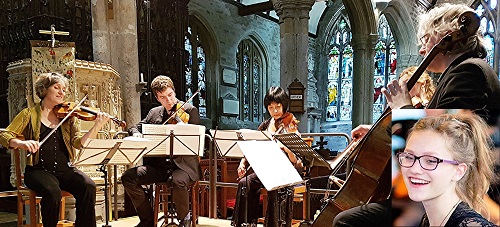 United Kingdom Schulhoff, Dvořák, Janáček: Dante String Quartet, Alinka Rowe (viola), St Eustachius Church, Tavistock. 14.7.2017. (PRB)
United Kingdom Schulhoff, Dvořák, Janáček: Dante String Quartet, Alinka Rowe (viola), St Eustachius Church, Tavistock. 14.7.2017. (PRB)

Erwin Schulhoff – Duo for violin and cello
Dvořák – Cypresses Nos.9 & 11; String Quintet in E flat, Op.97
Janáček – String Quartet No.2, ‘Intimate Letters’
This recital was the final concert of this year’s Dante Festival—a biennial five-day feast of chamber music in the beautiful Tamar Valley which separates the UK’s two western-most counties, Devon and Cornwall. Featuring the internationally renowned Dante String Quartet, the Festival presents top-class concerts in a variety of genres alongside informal workshops, open rehearsals—even delicious shared meals. It usually has a theme running through the event as a whole, all under the artistic direction and ever-watchful eye of Dante lead violinist Krysia Osostowicz.
Aptly entitled ‘Czech Mates’, this final event presented works by near-contemporaries Dvořák and Janáček, who became friends later in life, and the somewhat younger Erwin Schulhoff, whose successful career was prematurely terminated by the rise of the Nazi regime in Germany. Dvořák had encouraged Schulhoff’s earliest musical studies as a ten-year-old student at the Prague Conservatory, thereby completing the triangle.
In my previous review of the Dantes some three months earlier, I alluded to the not-unexpected changes in personnel over a number of years, and how this might affect the internal dynamic of such a finely-honed and essentially intimate machine as a string quartet. At that time, I commented on the contribution that cellist Richard Jenkinson made to the ensemble since joining them in 2012, particularly his unbridled enthusiasm, drive and consequent impetus from the bass line. However, the opening work of the present recital showed that he was not exactly alone in all of this.
By its very definition, the word ‘second’ can imply ‘subordinate or inferior in position, rank, or importance’. While this might appear slightly derogatory when applied to an orchestra’s Second Violins or an individual Second Violin in a quartet or similar, it nearly always appears that the ‘Firsts’ still get most of the best bits—and, of course, the glory. In today’s world of equality, a good number of ensembles, the Dantes included, have dispensed with ordinals where the two violins are concerned. This also has additional advantages. Psychologically both violin parts are equal even if, à la Animal Farm, one is more equal than the other. It is, however, far more important that the roles can be switched for different works in performance. I have it on good authority, for example, that during the five-day Festival, on at least one occasion, the regular ‘second violinist’ led, thereby swapping roles with Osostowicz.
Interestingly, the programme order showed that the concert would open with a brief selection from Dvořák’s Cypresses, but on the night the first two items were reversed. That was in aid of easier logistics, as Jenkinson pointed out, by starting with just two performers, and adding one for each successive work, up to the concluding quintet configuration.
Whether logistics was the reason, the change of order proved an absolute masterstroke. Erwin Schulhoff’s Duo for violin and cello was written in 1925, with the following dedication: ‘To Master Leoš Janáček in deep admiration’. As ‘second violinist’ Oscar Perks explained in his brief introduction and his own written programme note, the four-movement work owes far more to Ravel—whose Sonata for violin and cello had appeared a few years earlier—than to Janáček. Perks writes: ‘Schulhoff’s second movement also includes some fireworks lifted from the Hungarian gypsy style, including bouncing bow strokes, pizzicato with the left hand and other tricks which are sure to leave the players’ fingertips smouldering’. The ensuing performance, a veritable tour de force, certainly must have done this. It was fascinating to see the erstwhile more sedate ‘second violinist’ really come into his own, and match everything that cellist Jenkinson could throw at him, especially in terms of sheer dynamism and uninhibited panache, in a reading that could scarcely have been more immediate in its appeal. That was truly one of the evening’s undoubted highlights, yet ironically with the fewest number of players.
The programme cited three of Dvořák’s Cypresses, though this turned out to be just two on the night: Thou Only, Dear One (Ó duše drahá jedinká), and Nature Lies Peaceful in Slumber and Dreaming (Nad krajem vévodi lehký spánek). Dvořák transformed twelve love-songs from his song-cycle Cypresses into short pieces for string quartet, keeping the same title. Unsurprisingly, the string writing is quite different from that in his string quartets proper, while he still maintains the essential design of the original song: a brief introduction followed by two ‘verses’ of melody. As such, they are eminently pleasant to listen to, though just playing two examples was still felt sufficient to cushion the dramatic impact of the Schulhoff from the tremendous emotional roller-coaster of the work to follow.
Janáček’s String Quartet No.2, ‘Intimate Letters’, written in some twenty days just before his death at the age of seventy-four, is inspired by his unrequited love for the much-younger Kamila Stösslová. Though it is cast in four movements, there are so many abrupt changes of mood and tempo that to try to categorize them in conventional terms is unfeasible. Even so, each movement does maintain its own individual melodic and rhythmic substance that makes use of the composer’s characteristic style, combining his native Moravian folk music with motifs that appear to resemble a notated form of speech rhythms. Despite a broken string happening quite early on in the viola part, and which Yuko Inoue handled with consummate professionalism and minimal interruption to the overall musical flow, the Dantes came up with a quite superb reading. They managed the emotional range and constant juxtapositions with great aplomb, while always mindful of the basic tenet of this highly original and compelling work. Osostowicz commented in her programme note on the quartet’s ‘unique challenges inspiring each new ensemble to carve out its own interpretation’. With this well-studied performance, the Dantes surely exceeded her aim and expectations here.
The final work, Dvořák’s String Quintet in E flat, Op.97, proved an ideal close, not just to the recital, but also to this year’s Festival as a whole. First and foremost, it provided a perfect platform for eighteen-year-old Alinka Rowe, Osostowicz’s daughter, to join the ensemble as the second viola. Secondly, the composer had ensured an unusually even distribution of melodic material across all five instruments. Each part is treated very much as a soloist rather than mere accompanist. Rowe could not have asked for a work with a better opening. In a four-bar unaccompanied pentatonic melody, she produced a stunningly rich tone and full-bodied sound, despite the mezzo-forte (literally ‘half loud’) dynamic marking. The artists were perhaps a tad emotionally drained following the Janáček. It was not only the end of a demanding day, which involved a forty-five-minute open-discussion on ‘Intimate Letters’ prior to the start of the performance, but also the culmination of five days of hectic playing and activity. Despite that, the now-augmented Dantes gave a performance which certainly communicated the composer’s overall joyful and highly melodious score, and, spurred on by Perks and Jenkinson in particular, both rather like jockeys within sight of the finishing-post, did manage some collective smiles from all five players, as this happy music rounded the final bend.
Philip R Buttall
